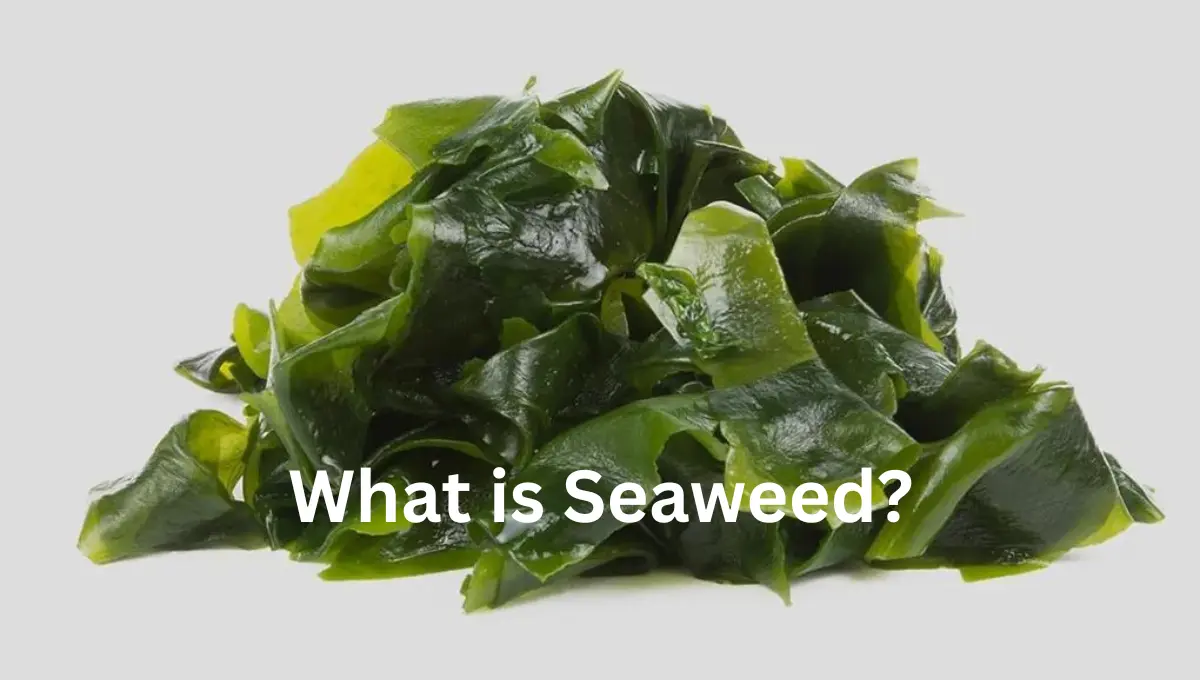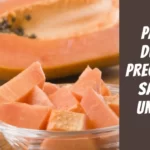
Pregnancy is a crucial time for women, and it is essential to maintain a healthy diet to ensure the well-being of both the mother and the baby. Seaweed is a popular food item that has gained attention for its numerous health benefits. However, many pregnant women are unsure if it is safe to consume seaweed during pregnancy.
In this article on PregnancyBoss, we will explore can pregnant women eat seaweed, its benefits and risks, and provide you with the information you need to make an informed decision.
Related: Is It Safe To Eat Halibut During Pregnancy?
What is Seaweed?

Seaweed, also known as macroalgae, is a type of marine algae that grows in oceans, rivers, lakes, and other water bodies. Seaweeds are generally anchored to the sea bottom or other solid structures by root-like “holdfasts,” which perform the sole function of attachment and do not extract nutrients as do the roots of higher plants. Seaweeds come in different colors, including red, green, brown, and black, and randomly wash up on beaches and shorelines just about everywhere.
Some seaweeds are microscopic, such as the phytoplankton that live suspended in the water column and provide the base for most marine food chains. Some are enormous, like the giant kelp that grow in abundant “forests” and tower like underwater redwoods from their roots at the bottom of the sea.
Related: Can You Eat Kielbasa When Pregnant?
What are different types of Seaweed?
Seaweeds can be broadly divided into two groups according to size: large or ‘macro’ algae (commonly referred to as seaweed) and microalgae, which can only be seen under a microscope. Seaweeds have a wide range of characteristics and can be divided into three groups – brown, red, and green – according to their pigmentation. Brown seaweeds, such as kelp and wakame, are the largest and most complex seaweeds. Red seaweeds, such as nori and Irish moss, are the most abundant and diverse group of seaweeds. Green seaweeds, such as sea lettuce, are the smallest and simplest seaweeds.
Related: Can You Safely Eat Mozzarella While Pregnant?
What is Nutritional Value of Seaweed?

| Nutrient | Amount per serving |
|---|---|
| Calories | 4.5-44.7 |
| Fat | 0-0.601 grams |
| Protein | 0.3-4.77 grams |
| Carbohydrates | 0.6-7.86 grams |
| Fiber | 0-1.3 grams |
| Sugars | 0-0.6 grams |
| Sodium | Varies based on brand and preparation method, up to 698 milligrams per cup (raw) |
| Vitamins and Minerals | Calcium, potassium, vitamin C, folate, beta carotene, vitamin K, iodine, manganese, copper, vitamin A, vitamin B1, vitamin B2, vitamin E, vitamin D, vitamin B12, iron, magnesium |
It is important to note that different types of seaweed have different nutritional values, and the nutritional content of seaweed can vary based on where it grows and what type it is.
Related: Can You Safely Eat Crawfish While Pregnant?
Can Pregnant Women Eat Seaweed?
Seaweed can be safely consumed in moderation during pregnancy. It is a good source of nutrients such as iodine, which is important for fetal brain development. However, some types of seaweed may contain an excess of iodine and should be eaten in moderation when pregnant. Pregnant women should limit their intake of brown seaweed to one serving per week, which is around 32g. Brown seaweeds include arame, wakame, and kelp. Seaweed salad should be okay to eat when pregnant, but it’s important to check what kind of seaweed the salad is made from. Ready-to-eat seaweed snacks may contain higher levels of iodine and sodium, so it’s better to eat fresh or low-sodium dried seaweed during pregnancy.
Related: Is It Safe To Eat Coleslaw While Pregnant?
What are Health Benefits of Seaweed for Pregnant Women?
Seaweed is a good addition to the diet of pregnant women as it provides various health benefits. Here are some of the health benefits of seaweed during pregnancy:
- Seaweed is rich in omega-3 fatty acids, which can help in better development of the fetal brain.
- It is rich in fiber and can help in keeping digestion troubles and constipation at bay during pregnancy.
- Seaweed is a good source of antioxidants, which may help in dealing with various kinds of medical ailments such as anxiety, depression, asthma, celiac disease, arthritis, and more.
- The abundance of vitamin C in seaweed helps in aiding the absorption of iron present in these seaweeds.
- Seaweed is helpful in the development of sexual organs, and it is also beneficial in reducing the chances of breast cancer.
- Seaweed is a good source of iron, which is especially crucial for vegan or vegetarian women as it’s one of the few non-animal sources.
What are Risks of Seaweed for Pregnant Women?
Here are the risks of eating seaweed for pregnant women:
- Too much iodine: While small amounts of iodine can be beneficial for fetal brain development, too much iodine can be a problem for the thyroid gland and lead to fetal hypothyroidism, which can impact the baby’s physical and mental development and lead to heart problems.
- Too much sodium: Too much sodium during pregnancy may lead to bloating, as well as increase the risk of preeclampsia.
- Complications during pregnancy: Some types of seaweed may contain an excess of iodine and should be eaten in moderation when pregnant. Consuming seaweed in more than the required amount may lead to possible complications during pregnancy and may even harm the unborn baby.
- Supplements: Pregnant women should avoid taking any dietary supplements that may contain seaweed in them, unless suggested by a healthcare provider.
Can you eat Seaweed Salad while Pregnant?
Yes, seaweed salad can be safely consumed in moderation during pregnancy. Seaweed salads are usually made with wakame, though some use hijiki, kelp, ogonori, or red dulse seaweed. Amongst these, the first three belong to the category of brown seaweeds – the ones that should be eaten moderately when pregnant. Pregnant women should limit their intake of brown seaweed to one serving per week, which is around 32g.
It’s important to check what kind of seaweed the salad is made from. Ready-to-eat seaweed snacks may contain higher levels of iodine and sodium, so it’s better to eat fresh or low-sodium dried seaweed during pregnancy. As with any dietary changes, it’s always best to consult a doctor before making any major changes to your diet, including adding seaweed or seaweed supplements.
How Much Seaweed Can Pregnant Women Consume?
According to the Food Standards Australia New Zealand (FSANZ), pregnant and breastfeeding women, and children should eat no more than one serve a week of brown seaweed. Nori and other types of red and green seaweed used in popular dishes such as sushi and dulse are not affected by this advice but should also be eaten in moderation. Pregnant women need to be aware of the risk of listeria from prepared sushi. Therefore, it is recommended to consult with a doctor or a nutritionist before adding seaweed to your diet during pregnancy.
What are some ways to incorporate Seaweed into a Pregnancy Diet?
Here are some ways to incorporate seaweed into a pregnancy diet:
- Seaweed salad: Seaweed salad should be okay to eat when pregnant, but it’s important to check what kind of seaweed the salad is made from.
- Sushi rolls: Sushi rolls that contain seaweed, such as nori, can be a good way to incorporate seaweed into your diet during pregnancy.
- Snacks: Fresh or low-sodium dried seaweed can be a healthy snack option during pregnancy.
- Smoothies: Adding seaweed to smoothies can be a great way to incorporate it into your diet.
- Soups: Seaweed can be added to soups for a nutrient boost.
Conclusion
Seaweed is a nutrient-dense food that can provide numerous health benefits during pregnancy. However, pregnant women should consume it in moderation and avoid consuming large quantities of brown seaweed due to its high iodine content. It is always recommended to consult with a doctor or a nutritionist before making any significant changes to your diet during pregnancy. By following these guidelines, pregnant women can safely enjoy the benefits of seaweed while ensuring the well-being of both the mother and the baby.
Frequently Asked Questions (FAQs)
Can seaweed help with morning sickness?
Some pregnant women find relief from nausea by consuming ginger-flavored seaweed snacks.
Are there any seaweed types to avoid during pregnancy?
Avoid brown seaweed supplements, as they may contain excess iodine and heavy metals.
Can I meet my calcium needs through seaweed alone?
While seaweed contains calcium, it’s advisable to include other calcium-rich foods in your diet.
How often can I eat seaweed while pregnant?
Moderation is key; a couple of servings per week is a reasonable guideline.
Is it safe to consume seaweed in the first trimester?
Consult your healthcare provider before making any significant dietary changes during pregnancy.












